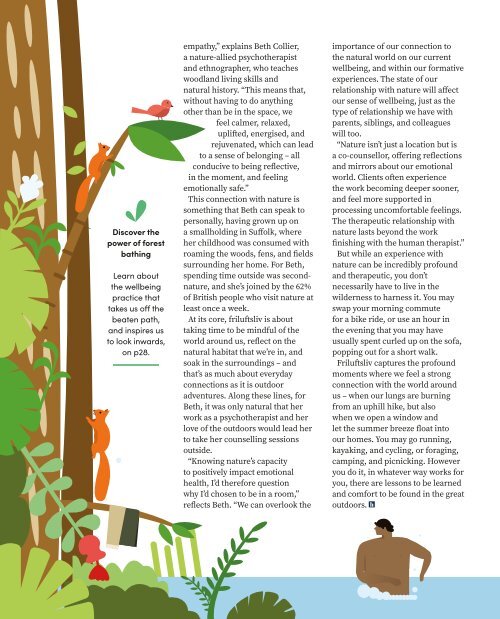Happiful August 2020
You also want an ePaper? Increase the reach of your titles
YUMPU automatically turns print PDFs into web optimized ePapers that Google loves.
Discover the<br />
power of forest<br />
bathing<br />
Learn about<br />
the wellbeing<br />
practice that<br />
takes us off the<br />
beaten path,<br />
and inspires us<br />
to look inwards,<br />
on p28.<br />
empathy,” explains Beth Collier,<br />
a nature-allied psychotherapist<br />
and ethnographer, who teaches<br />
woodland living skills and<br />
natural history. “This means that,<br />
without having to do anything<br />
other than be in the space, we<br />
feel calmer, relaxed,<br />
uplifted, energised, and<br />
rejuvenated, which can lead<br />
to a sense of belonging – all<br />
conducive to being reflective,<br />
in the moment, and feeling<br />
emotionally safe.”<br />
This connection with nature is<br />
something that Beth can speak to<br />
personally, having grown up on<br />
a smallholding in Suffolk, where<br />
her childhood was consumed with<br />
roaming the woods, fens, and fields<br />
surrounding her home. For Beth,<br />
spending time outside was secondnature,<br />
and she’s joined by the 62%<br />
of British people who visit nature at<br />
least once a week.<br />
At its core, friluftsliv is about<br />
taking time to be mindful of the<br />
world around us, reflect on the<br />
natural habitat that we’re in, and<br />
soak in the surroundings – and<br />
that’s as much about everyday<br />
connections as it is outdoor<br />
adventures. Along these lines, for<br />
Beth, it was only natural that her<br />
work as a psychotherapist and her<br />
love of the outdoors would lead her<br />
to take her counselling sessions<br />
outside.<br />
“Knowing nature’s capacity<br />
to positively impact emotional<br />
health, I’d therefore question<br />
why I’d chosen to be in a room,”<br />
reflects Beth. “We can overlook the<br />
importance of our connection to<br />
the natural world on our current<br />
wellbeing, and within our formative<br />
experiences. The state of our<br />
relationship with nature will affect<br />
our sense of wellbeing, just as the<br />
type of relationship we have with<br />
parents, siblings, and colleagues<br />
will too.<br />
“Nature isn’t just a location but is<br />
a co-counsellor, offering reflections<br />
and mirrors about our emotional<br />
world. Clients often experience<br />
the work becoming deeper sooner,<br />
and feel more supported in<br />
processing uncomfortable feelings.<br />
The therapeutic relationship with<br />
nature lasts beyond the work<br />
finishing with the human therapist.”<br />
But while an experience with<br />
nature can be incredibly profound<br />
and therapeutic, you don’t<br />
necessarily have to live in the<br />
wilderness to harness it. You may<br />
swap your morning commute<br />
for a bike ride, or use an hour in<br />
the evening that you may have<br />
usually spent curled up on the sofa,<br />
popping out for a short walk.<br />
Friluftsliv captures the profound<br />
moments where we feel a strong<br />
connection with the world around<br />
us – when our lungs are burning<br />
from an uphill hike, but also<br />
when we open a window and<br />
let the summer breeze float into<br />
our homes. You may go running,<br />
kayaking, and cycling, or foraging,<br />
camping, and picnicking. However<br />
you do it, in whatever way works for<br />
you, there are lessons to be learned<br />
and comfort to be found in the great<br />
outdoors.<br />
July <strong>2020</strong> • happiful.com • 15

















